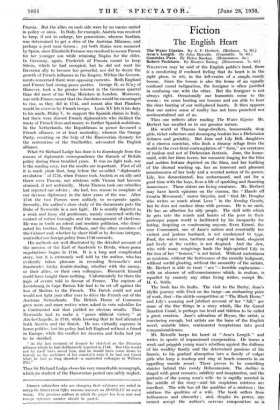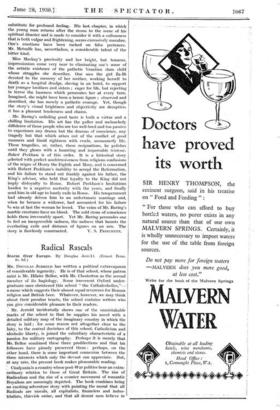Fiction
The English Heart
WHATEVER may be said of the English public's head, there is a comforting if confused feeling that its heart is in the right place, to wit, in the left-centre of a simple, manly.
bosom. Since the bosom is also the home of an equally confused moral indignation, the foreigner is often justified in confusing one with the other. But the foreigner is not always right. Occasionally our humorists come to the, rescue ; we cease beating our bosoms and are able to hear the clear beating of our well-placed hearts. It then appears. that our native sense of reality has not been preached nor sentimentalized out of us.
• Thus one reflects after reading The Water Gipsies Mr.
Herbert has recalled us to our genuine nature.
His world of Thames barge-dwellers, housemaids, shop girls, ticket collectors and decamping bookies has a Dickensian,
richness and geniality. But Jane and Lily Bell, daughters of a cinema musician, who finds a dreamy refuge from the world in the ever-fatal contemplation of" form," are creatures of realism and not of Dickensian fantasia. Jane, the house- maid, with her three lovers, her romantic longing for the bliss
and sudden fortune depicted on the films, and her loathing- of the diurnal washing up, has an innocent and pleasant' consciousness of her body and a worried notion of its power.: Lily, less domesticated, less embarrassed, and out for a good time with the boys, lives a life of sparkling and flaunting insouciance. These sisters are living creatures. Mr. Herbert; may have harsh opinions on the cinema, the "Hands off Croatia Movement," motor bicycles, and "that Mr. Douglas' who writes so much about Love" in the Sunday Gazettes;
but he does not confuse ideas with persons. He is no snob.
He has an affection for silly people. The skill with which he gets into the minds and hearts of the poor in their grotesque pagan world is facilitated by his incapacity for hating, despising or condemning anyone. Even Ernest, the sour Communist, one of Jane's suitors and eventually her violent and *jealous husband, is not condemned to type. Fred, the water man, taciturn and stupid on land, eloquent and lively at the rudder, is not despised. And the Jew, who with many misgivings leads the high-spirited Lily to the loss of her "honour," is not hated. Without melodrama
or cynicism, without the furtiveness of the morally indignant, without sordid gloating, without the amorality of the satiate, Mr. Herbert is able to treat "sex "—horrible euphemism—
with an absence of self-consciousness which, in realism, is equalled by scarcely any other living writer, except Mr. H. G. Wells.
The book has its faults. The visit to the Derby, Jane's idyllic journey with Fred on the barge—an enchanting piese Of work, that—the skittle competition at "The Black Horse," 'and Lily's amazing and jubilant account of her "fall," are some of the fine --things in a story which, like the Grand Junction Canal, is perhaps too level and tideless to be called a great creation. Jane's adoration of Bryan-, the artist, is 'convincing enough, but artists are the bane of the English novel, amiable blurs,. sentimental temptations into good cDmpanionableness.
Mr. Metcalfe keeps his 'heart 'at "Arm's Length" and
'writes in spurts of impassioned exasperation. He traces -a
weak and priggish young man's rebellion against the dullness 'of his wealthy family and the determined passions of his 'fiancée, to his gradual absorption into a family of vulgar
girls who keep a teashop and sing at beach concerts in an 'appalling seaside resort. There proves to be something sinister behind this rowdy Bohemianism. The decline, is 'staged with great resource; subtlety and imagination, and the 'portraits of the young man's Wife—he is rapidly married in
the middle of the story—'-and his suspicious mistress are excellent. The wife has all the qualities of a mistress ; the mistress the qualities of a wife. The book suffers from .tediousness and obscurity ; and, despite its power, One substitute fot .profound. feeling. "His last- chapter, in which' the young man returns after the storm to the scene of his spiritual disaster and is made to consider it with a callousness that is both vulgar and frightening, seems excessively macabre. One's emotions have been racked on false pretences. Mr. Metcalfe has, nevertheless, a considerable talent of the bitter kind.
Miss Mackay's preciosity and her bright, but tenuous, impressionism come very near to eliminating one's sense of the artistic existence of the pathetic Venetian slum child whose struggles she describes. One sees the girl Za-Bi devoted to the memory of her mother, working herself to death as a hospital drudge, slaving in an hotel, to support her younger brothers and sisters ; eager for life, but rejecting in terror the baseness which persecutes her at every turn. Imagined, she might have been a heroic figure ; observed and described, she has merely a pathetic courage. Yet, though the story's visual brightness and objectivity are deceptive, it has a pleasant tenderness and charm.
Mr. Baring's unfailing good taste is both a virtue and a chilling limitation. His art has the pallor and melancholy diffidence of those people who are too well-bred and too passive to experience any drama but the dramas of conscience, any tragedy but that which arises out of the conflict of good manners and timid rightness with crude, unmannerly life. These tragedies, or, rather, these resignations, he polishes until they gleam with a haunting and impeccable tristesse. Robert Peckham is of this order. It is a historical story §elected with perfect unobtrusiveness from religious confusions of the reigns of Henry the Eighth and Mary, and is concerned with Robert Peckham's inability to accept the Reformation, and his failure to stand out frankly against his father, the King's adviser, who held that loyalty to the King did not Imply disloyalty to Rome. Robert Peckham's hesitations harden to a negative austerity with the years, and finally send him, in old age to lonely exile in Rome. His temperament had already driven him to an unfortunate marriage and, when he became a widower, had accounted for his failure to win at last the woman he loved. The veins of Mr. Baring's marble creatures have no blood; The cold stone of conscience holds them irrevocably apart. Yet Mr. Baring persuades one to feel an inexpressible sadness, the sadness that haunts the everlasting exile and distance of figures on an urn. The



















































 Previous page
Previous page